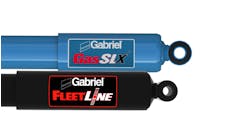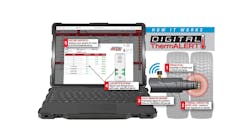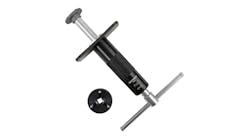As the weather turns colder, fleets begin preparing their trucks for the long winter season. Winterizing vehicles will include many systems checks, but be sure to pay special attention to the air system.
Clean, dry air is more important than ever with today’s vehicles using compressed air not only for air brake systems, but also for non-braking functions including air suspensions, automated manual transmissions, emissions controls and advanced safety technologies.
Winter can be particularly rough on a vehicle’s air system. Though the cold itself might not directly affect the air system, the moisture brought into the system via the air compressor can adversely affect air system operation.
Too much moisture can lead to air line freezing, which in turn can cause problems with any of the systems that rely on clean, dry air to function properly. Frigid conditions can cause excess moisture to freeze up. When any part of a truck’s air system is frozen, systems can malfunction, bringing the truck to a stop. A stopped truck can cost a fleet approximately $100 per day, per vehicle.
What causes moisture?
During operation, an air compressor builds air pressure and pushes it down the air lines to the vehicle systems. The process of compressing the air creates heat, which leads to condensation creating water and oil vapor. As the compressed air cools, the oil vapor converts into a more liquid sludge.
The air passes first through an air dryer’s desiccant to lower its humidity and reduce the dew point. Once through the air dryer, the air then passes to the wet tank, where it continues to cool and the water and oil vapor become more liquid.
This creates an emulsion which, if not removed from the system, will impact the performance and function of components which rely on clean, dry air. In winter conditions, this emulsion can freeze, causing any of the air-reliant systems to malfunction. Damage to the air compressor can result from over cycling, which can be caused by a problem with the compressor itself. Reduced capacity in the air system as a result of water buildup can also damage the air compressor.
Winter can wreak havoc with many parts of the air system, including causing a negative impact on the air dryer’s ability to remove moisture. Freeze-and-thaw cycles can place additional strain on dryer valves, and de-icing solutions can corrode purge valves.
There are several precautions to take when getting a vehicle’s air system ready to combat winter conditions.
Check the air lines
Make sure discharge lines slope downward from the compressor discharge port without forming water traps, kinks or other restrictions. Drooping lines can cause water traps, which can freeze much more easily. The maximum length for a discharge line is 16'. For pick-up and delivery and line-haul trucks, the last three feet of the discharge line, including the fitting at the end of the discharge line, must be insulated with 1/2" thick closed cell polyethylene pipe insulation.
Air dryer maintenance
An easy first step to winterizing a vehicle is to keep the air dryer in top shape. Be sure to change the air dryer desiccant cartridge in fall to start the winter off on the right foot.
Drain the air tanks
Air tanks can accumulate water and other contaminants, which must be drained to ensure clean, dry air. The best practice is to drain all tanks daily. After turning off the truck's engine, drain all of the air from each tank. An alternate method for draining the tanks is to open the drain cocks on all tanks and leave them open overnight to assure all contamination is drained.
Ideally, the driver should perform this task when he or she returns to the terminal; however, restrictions on hours of service may prevent the driver from being able to do so. Often, technicians have bigger issues to deal with than draining air tanks, so they may skip the manual task as well.
Automatic drain valves can remove the human factor altogether. If automatic drain valves are installed, be sure to check their operation before the weather turns cold. Automatic drain valves eliminate the need for daily reservoir draining, but be aware that periodic manual draining may still be required.
Manually draining the air tanks can be a simple step to help keep the air system moisture-free during winter. For a typical line-haul truck, drain tanks at least every three months, up to as frequently as once a month for vehicles with high air demand.
When a system freezes
Often, winter weather takes its toll and part of a vehicle’s system can freeze. In these cases, fleets and drivers use alcohol or a similar de-icing solution to quickly thaw the affected area and get back on the road.
Many of these alcohol-based chemicals can cause leaks or valve malfunctions by corroding the compounds used in valve seals and lubricants. Try to determine the precise location of the freeze-up and treat only that area to avoid exposing other parts of the system to the chemical. If alcohol-based chemicals are used as a quick fix, be sure to inspect the area later to check for leaks, corrosion or other damage.
If a freeze-up occurs while a truck is sitting in the terminal, the safest way to thaw out frozen air lines and valves is by moving the vehicle into a warmed building. Do not immediately park a vehicle outside after thawing its air system indoors. Condensation will form in the system and re-freeze. Place the vehicle in operation as soon as it is moved back outside.
With a little preventive maintenance, fleets can avoid air system freezing during winter.
Information provided by Erik Johnson, sales manager, Expello.



